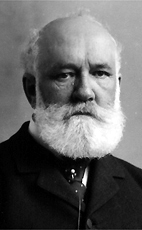Andrew George Blair
Andrew George Blair PC KC (* 7. March 1844 in Fredericton , New Brunswick ; † 25. January 1907 ) was a Canadian politician of the Liberal Party . Between 1883 and 1896 he served as Prime Minister of the Province of New Brunswick. He was then from 1896 to 1903 Member of the House of Commons and held the office of Minister for Railways and Canals in the 8th Canadian Cabinet of Prime Minister Wilfrid Laurier .
Life
Attorney, opposition leader and Prime Minister of New Brunswick
Blair completed a law degree after attending school and worked as a lawyer and lecturer after completing his studies . For his lawyer's merits, he later became Attorney-General (King's Counsel) appointed.
In June 1878 he was elected as a candidate for the New Brunswick Liberal Association for the first time in the Legislative Assembly of New Brunswick , where he initially represented the constituency of York County and, most recently, since 1892 the constituency of York County . During this time he was between February 1879 and March 1883 as chairman of the group of the Liberal Party opposition leader in the Legislative Assembly and thus parliamentary opponent of the then Prime Ministers John James Fraser and Daniel Lionel Hanington of the Conservative Party .
On March 3, 1883, Blair succeeded Daniel Lionel Hanington himself and finally became Prime Minister of New Brunswick and held this office for more than 13 years until July 16, 1896. At the same time he acted as Attorney General of this province of Canada . During his tenure, he led the Liberals several times successfully in the election to the legislative assembly on April 26, 1886, January 20, 1890, October 1892 and 1895. The Liberals achieved between 25 and 33 seats in the 41-member assembly, or most recently 34 of the 46 seats in the 1895 election and were able to clearly outperform the Conservatives, which only had 8 seats (1886) and a maximum of 15 seats (1890). Blair thus had comfortable absolute majorities in each case.
He was succeeded as Prime Minister New Brunswick on July 17, 1896 by James Mitchell .
Federal Minister and Member of the House of Commons
After the end of his tenure as Prime Minister of New Brunswick Blair switched to federal politics and was appointed Minister for Railways and Canals in the 8th Canadian Cabinet by Prime Minister Wilfrid Laurier on July 20, 1896. From this ministerial office he resigned on July 20, 1903 because of his dissenting opinion regarding the transcontinental railroad projects of the Canadian Pacific Railway .
Shortly after his appointment to the federal cabinet, he was elected for the first time to the House of Commons for the Liberal Party of Canada on August 25, 1896 in a by-election in the Sunbury-Queen’s constituency in New Brunswick and represented there since the House of Commons election from November 7, 1900 to to his voluntary resignation on December 28, 1903, also the constituency of the City of St. John, also located in New Brunswick .
Henry Albert Harper, a close friend of then Vice Secretary of Labor and later Prime Minister William Lyon Mackenzie King , died in December 1901 while trying to save the daughter of Railroad Secretary Blair, who fell while ice skating in the Ottawa River . King then suggested that a statue be erected in Harper's honor. The Galahad statue, modeled on him , was unveiled in 1905 at the main entrance to the parliament building. The following year King wrote a heroic biography of Harper.
Shortly before leaving the House of Commons, on December 24, 1903, he became chairman of a federal commission to investigate organizational methods and systems in the railways in the United States, and held this position until 1904.
Four days later, when he left the House of Commons on December 28, 1903, he became Chief Commissioner and thus Chairman of the Canadian Railways Commission and held this position until his death on January 25, 1907. His deputy at the time was Michel Esdras Bernier , previously Minister for Domestic Taxes was in the 8th Canadian Cabinet.
Blair was the maternal grandfather of Francis Andrew Brewin , who was also a member of the House of Commons between 1962 and 1978. His great-grandson, John F. Brewin, was also a member of the House of Commons from 1988 to 1993.
Web links and sources
- DM Young: Andrew George Blair . In: Dictionary of Canadian Biography . 24 volumes, 1966–2018. University of Toronto Press, Toronto ( English , French ).
- Andrew George Blair - biographical information on the website of the Canadian Parliament (English)
- Canadian Ministries at rulers.org
Individual evidence
- ^ Henry Albert Harper . In: Dictionary of Canadian Biography . 24 volumes, 1966–2018. University of Toronto Press, Toronto ( English , French ).
| personal data | |
|---|---|
| SURNAME | Blair, Andrew George |
| BRIEF DESCRIPTION | Canadian politician |
| DATE OF BIRTH | March 7, 1844 |
| PLACE OF BIRTH | Fredericton , New Brunswick |
| DATE OF DEATH | January 25, 1907 |

